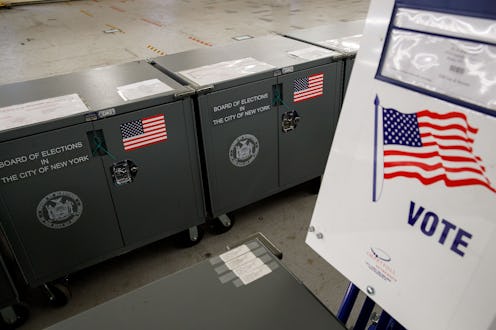News
This Many People Didn't Vote In The 2016 Election
The United States is known for being a country with low voter turnout. Despite being eligible to cast their ballots, many potential voters sit out Election Day. But exactly how many people didn't vote in the 2016 election?
The percentage of eligible citizens that actually vote during presidential election years has moved between 48 percent and 57 percent since 1980, BBC News reported. And only around 40 percent of eligible voters show up for midterm elections, according to FairVote, a non-profit that advocates for voting reform in the United States. This is low in comparison to other developed democracies; in France, voter turnout is regularly more than 80 percent, BBC News reported. And the pattern of low turnout seemed likely to continue on Election Day, considering how disliked both Hillary Clinton and Donald Trump are; prior to the election, a ABC News/Washington Post poll found them to be the two most disliked presidential candidates in more than 30 years.
So it isn't a surprise that approximately 117 million people who were eligible to vote didn't in this year's election, according to Canada's Global News. Only 200 million people out of the 241 million eligible were actually registered to vote, putting voter turnout around 51 to 52 percent.
There are several reasons behind the low levels of voter turnout. For one, the presidential election is more competitive in some states than in others. West Coast states have overwhelmingly voted for the Democratic Party candidate in the previous four presidential elections. Theoretically, this could make Republicans or Republican-voting independents in these states less likely to show up to the polls since it's less likely their candidate will win. On the other hand, voters in "swing states," where the elections are more competitive, are more likely to make it to the polls since there's a commonly held perception that their vote makes a bigger difference.
Demographically speaking, when compared to non-voters, voters tend to be older, whiter, richer, and more educated, FairVote reported. Non-voters are disproportionately lower-income and members of minority racial/ethnic groups. Voting laws have also impacted voter turnout; more than 21 million otherwise eligible voters don't possess the necessary forms of voter identification, according to the ACLU. Seeing as both money and transportation are required to access government-issued IDs, people with lower incomes and/or mobility issues are at a disadvantage when it comes to obtaining voter identification.
Additionally, the probability that voter fraud will occur is low; a comprehensive study by Loyola Law School Professor Justin Levitt found just 31 incidents out of a billion ballots. Seeing as a presidential election has never been won by such a small margin, stricter voter identification laws seem unnecessary. And, people who commit felonies may be permanently disenfranchised depending on their state of residence.
Voting is a fundamental right of adult U.S. citizens; it's protected by the 1st, 14th, 15th, 19th, 24th, and 26th constitutional amendments. It seems unfair that some laws make it more difficult for some Americans to exercise such an important democratic right.
